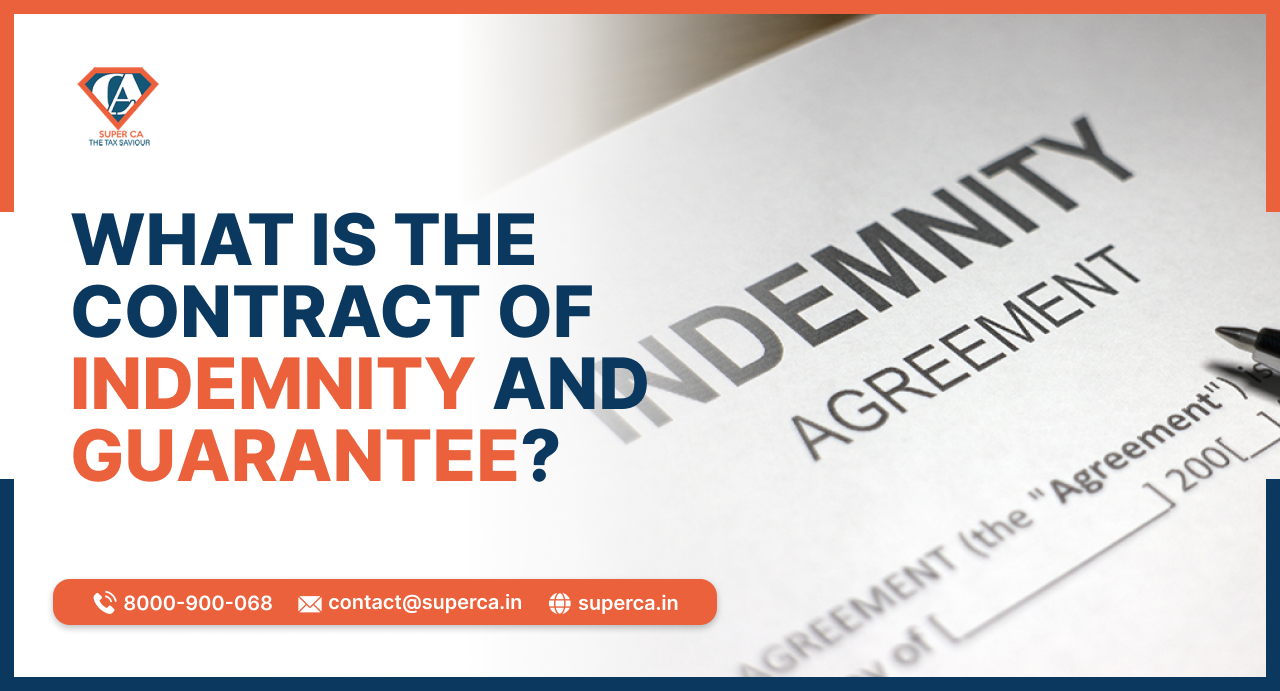What is the Contract of Indemnity and Guarantee?


Two special contracts are listed under the Indian Contract Act, 1872. These are the contract of indemnity and the contract of guarantee. A contract in which one of the individuals compensates for the loss of another individual, it is known as a contract of indemnity, while a contract of three individuals in which the third individual wishes to pay the debt for a debtor who is at default in paying back, is known as a contract of guarantee. In this blog, we will discuss the contract of indemnity and the contract of guarantee.
A contract in which one of the individuals tries to help the other party and compensates the other individuals for the loss, is known as a contract of indemnity. Individual who gives the indemnity is known as the indemnifier whereas the individual who receives the indemnity order to pay the loss is known as an indemnity-holder or an indemnified.
The indemnified possesses certain rights using which he can enforce the following from the contract of the indemnifier:
The indemnity is not given only for repaying after the payment. Rather it is needed that the indemnified can never come up to pay. Most of the courts state that once the liability to pay is accurate and clear by the indemnified, he will have the right to make the indemnifier meet the claims of repayment.
This bond allows an employee to leave the employment before the agreed period. It is valid only if the bond money and the restriction period are reasonable; this withdrawal can be applied only at the forfeiture cost of the bond money.
A contract in which a third party discharges the debtor's liability to the creditor. The individual who is given the guarantee to repay his debt is known as the principal debtor and the individual to whom the guarantee is to be paid by the principal debtor is known as a creditor. The guarantee can be either written or oral. With the help of the contract the principal debtor can provide employment, loan or goods on credit and ensure repayment for any default of the debtor.
A principal debtor: A guarantee is only given to secure a debt. A guarantee is important for a recoverable debt to exist. The contract of guarantee must consist of the essentials of a valid contract. The guarantee will be valid even if the principal debtor is incompetent. However, if the surety is incompetent then the contract will be invalid.
Consideration: Valid consideration is required for a contract to be valid. the principal debtor's consideration is sufficient enough for the surety to give a guarantee.
Misrepresentation: A contract will be considered invalid if it is Misrepresented. This misrepresentation can be the fault of the creditor. Also, if the creditor doesn't speak up on the material circumstances then the guarantee will be invalid.
Surety 's liability
The liability of the surety and of the principal debtor are coextensive unless provided by the contract. This is the maximum surety's liability. But the surety can limit his liability with the help of a contract. The contract can state that the surety will be liable only for a specific extent of the principal debtor's liability.
Coextensive with the principal debtor's liability
According to the general rules, all the debts of the principal creditor will be paid by the surety. The principal debtor is allowed to recover interests, damages and costs from the surety, however there can be some exceptions to it.
Commencement
It commences right after the principal debtor's default exceeds the responsibility of the surety. The creditor may or may not sue or send a notice to the principal debtor. The liability and guarantee of the surety will be effective only till such limits.
Continuing guarantee
A continuing guarantee is the guarantee which continues for a series of transactions.
Joint debtor and surety-ship
A contract between two people with a third party in order to take specific liability is known as a joint-debtor and surety-ship. The two individuals will come into a contract with each other in such a way that one of them will be liable for the default of the other individual. The second contract will not concern the third party. The liability of the two people with the third party will not be affected even with the existence of a second contract.
Discharging liability of surety
A surety will only be free from the liability after the limit of his liability ends. The surety can be discharged from his liabilities through the following:
In this blog, we discussed in detail the contract of indemnity and guarantee, the rights of the indemnity holder, commencement of the liability and indemnity bonds. We also discussed the contract of guarantee under which we discussed the principal debtor, consideration and misrepresentation. We also came across liability of a surety, joint-debt and surety-ship and the rights of the surety and discharging the liability of a surety.

|
Essential LLP Registration Documents: A Complete Checklist for Entrepreneurs Author: Rahul Singh 04 Apr, 2024
|
Get inspired by these stories.